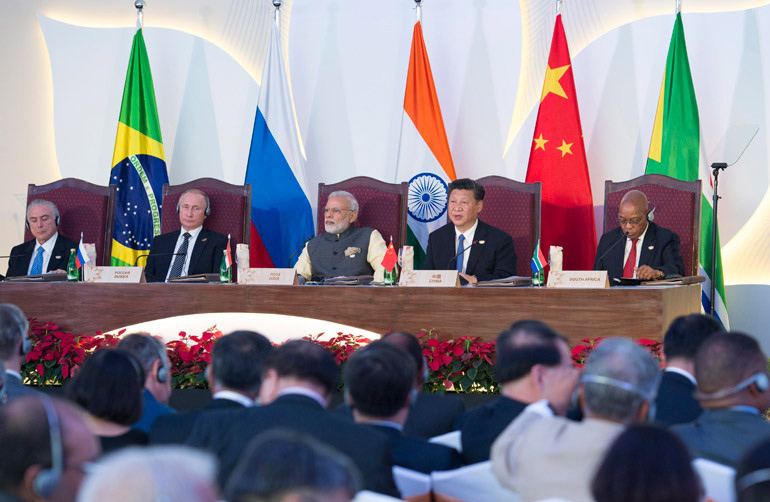As BRICS president, China to focus on practical cooperation

President Xi Jinping attends the BRICS Business Council on Oct. 16, 2016 during the eighth BRICS Summit in Goa, India.
Scholars have begun brainstorming about ways China can actively guide and promote cooperation within BRICS during its tenure as president of the bloc this year.
The establishment of the BRICS Development Bank and BRICS Contingent Reserve Arrangement in 2014 signaled the upgrading of cooperation from symbolic to practical. Deepening practical cooperation among BRICS members will be the priority of the upcoming Xiamen Summit in September, said Zhu Jiejin, an associate professor from the BRICS Countries Research Center at Fudan University.
At the Durban Summit in 2013, China proposed a plan to promote practical cooperation among the BRICS countries that covers economy, trade, finance, infrastructure and culture, Zhu said. The Xiamen Summit will deepen practical cooperation within the bloc under this framework, he said.
Currently, economic globalization is undergoing a phase of periodic adjustment, and global growth is weak, said Li Jianmin, a research fellow from the Institute of Russian, Eastern European and Central Asian Studies under the Chinese Academy of Social Sciences (CASS).
In this context, BRICS countries should cooperate to weather this difficult time, Li said. The priority of BRICS is to avoid trade protectionism within the bloc and to improve internal cohesion by fostering a common market, he said.
Finance has been the focus of BRICS cooperation in the first decade of its history. To upgrade financial cooperation, the BRICS Contingent Reserve Arrangement should be integrated at the upcoming Xiamen Summit with the regional foreign-exchange reserve pool established by the Chiang Mai Initiative Multilateralization, said Feng Weijiang, director of the International Political Economy Division at the Institute of World Economy and Politics under CASS. The expansion of foreign exchange swaps after the integration will increase confidence in the regional and global financial stability, Feng said.
The Xiamen Summit will also be a chance for BRICS to cooperate on global governance. Li said the bloc should continue to coordinate their policies in economic growth, financial reform, climate change and trade friction, and speak on behalf of the emerging and developing countries. In this way, the pattern of global governance may transition from one dominated by the West to one in which the East and the West share responsibility equally, Li added.
Through the platform of BRICS, member countries should communicate to the world ideas of governance that have proven effective in practice, Feng said. These ideas include the global governance concept of shared growth through discussion and collaboration as well as economic governance principles based on equality, guided by openness, motivated by cooperation and aimed at shared development, he said.
Think tank cooperation and academic communication is expected to deepen the mutual understanding among the BRICS countries. Wang Lei, director of the Center on BRICS Countries Cooperation at Beijing Normal University, suggested that the BRICS Think Tank Council should be transformed from a loose mechanism to a joint think tank of BRICS, providing policy consultation and routine coordination.
To broaden the partnership among the BRICS countries, Wang suggested such problems as overlapping functions should be avoided in mechanism establishment by integrating relevant mechanisms and developing a coordinated and integrated cooperation mechanism with a clear division of labor, Wang said.
Mao Li is a reporter at the Chinese Social Sciences Today.
